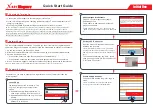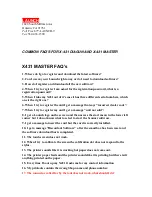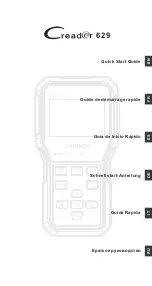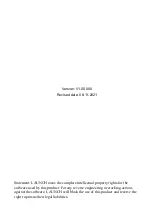
Pulse oximetry
Saturation Seconds,” where points equals SpO
2
percentage points at or outside the
limit, and seconds equals the number of seconds SpO
2
remains at that point outside
the limit.
The following table demonstrates the alarm response time with a Saturation Seconds
limit set at 30 and a low limit of 80%. The SpO
2
level drops to 79% (2 points) and
remains there for two seconds. Then it drops to 76% (5 points) for three seconds, and
then to 75% (6 points) for two seconds. The resulting Saturation Seconds are:
SpO
2
saturation change
Clock seconds
Saturation Seconds
2x
2 =
4
5x
3 =
15
6x
2 =
12
Total Saturation Seconds
31
After approximately seven seconds, the alarm would sound because 30 Saturation
Seconds would have been exceeded (arrow in the following figure).
SpO
2
saturation %
Seconds
Saturation Seconds alarm response example
Saturation levels may fluctuate above and below an alarm limit, re-entering the
acceptable range (non-alarm range) several times. During such fluctuation, the
monitor integrates the number of SpO
2
saturation points, both positive and negative,
until either the Saturation Seconds limit is reached or the saturation level returns to
within the normal range and remains there.
When an SpO
2
saturation value exceeds an alarm limit, a pie chart (circular graph) in
the SpO
2
parameter menu begins to fill in a clockwise direction. As seconds pass and
the value is compared against the alarm limits and the Saturation Seconds setting, the
chart fills proportionately. When the pie chart is completely filled, indicating that the
Saturation Seconds limit has been reached, an alarm sounds. When the SpO
2
value is
within the set limits, the Saturation Seconds pie chart empties in a counterclockwise
direction.
Showing the Saturation Seconds in the SpO
2
parameter window
NOTE
PDM and TRAM with primary SpO
2
measurement and the
Nellcor option only.
212
CARESCAPE Modular Monitors
2062971-001
Summary of Contents for CARESCAPE
Page 38: ...38 CARESCAPE Modular Monitors 2062971 001 ...
Page 114: ...Setting up the monitor before use 114 CARESCAPE Modular Monitors 2062971 001 ...
Page 146: ...Alarms 146 CARESCAPE Modular Monitors 2062971 001 ...
Page 218: ...Pulse oximetry 218 CARESCAPE Modular Monitors 2062971 001 ...
Page 234: ...Non invasive blood pressure 234 CARESCAPE Modular Monitors 2062971 001 ...
Page 260: ...Temperature 260 CARESCAPE Modular Monitors 2062971 001 ...
Page 274: ...Cardiac output 274 CARESCAPE Modular Monitors 2062971 001 ...
Page 280: ...Mixed venous oxygen saturation SvO 280 CARESCAPE Modular Monitors 2062971 001 ...
Page 338: ...Patient Spirometry 338 CARESCAPE Modular Monitors 2062971 001 ...
Page 372: ...Neuromuscular transmission 372 CARESCAPE Modular Monitors 2062971 001 ...
Page 404: ...Laboratory data 404 CARESCAPE Modular Monitors 2062971 001 ...
Page 410: ...Calculations 410 CARESCAPE Modular Monitors 2062971 001 ...
Page 416: ...Drug calculations 416 CARESCAPE Modular Monitors 2062971 001 ...
Page 424: ...Trends 424 CARESCAPE Modular Monitors 2062971 001 ...
Page 432: ...Snapshots and events 432 CARESCAPE Modular Monitors 2062971 001 ...
Page 462: ...Cleaning and care 462 CARESCAPE Modular Monitors 2062971 001 ...
Page 528: ...Abbreviations yr year yrs years 528 CARESCAPE Modular Monitors 2062971 001 ...
Page 546: ...Skills checklist 546 CARESCAPE Modular Monitors 2062971 001 ...
Page 547: ...content ...
















































